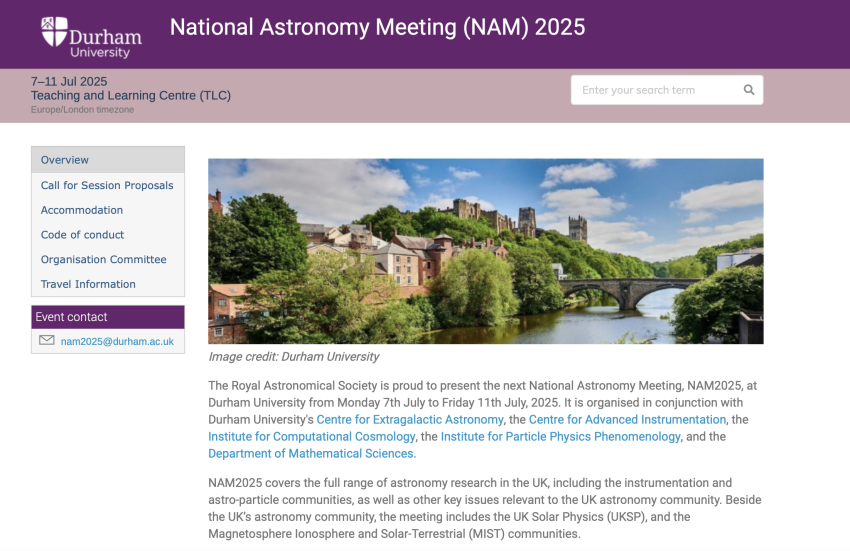The Royal Astronomical Society is delighted to announce that the 2025 National Astronomy Meeting will be held at Durham University from 7-11 July.
It will see leading scientists from the UK and around the world present the newest cutting-edge research in astronomy, astrophysics, space science and solar physics, among other areas.
The annual meeting, which was hosted by the University of Hull earlier this year, is the UK's largest regular gathering of professional astronomers and space scientists.
Next year's gathering will also be a hybrid conference, in which the majority of participants attend in person, but with the opportunity for remote participation for additional delegates.
NAM2025 is organised in conjunction with Durham University's Centre for Extragalactic Astronomy, the Centre for Advanced Instrumentation, the Institute for Computational Cosmology, the Institute for Particle Physics Phenomenology, and the Department of Mathematical Sciences.
In addition to the UK's broad astronomy community, including the astro-particle and instrumentation communities, the conference is also focused on the UK Solar Physics (UKSP) community with participation from the Magnetosphere Ionosphere and Solar-Terrestrial (MIST) and planetary geophysics communities.
To coincide with the announcement, NAM2025 organisers have also opened the call for session-proposal submissions.
They are encouraging members of all communities across all levels of seniority to apply for specialist and cross-disciplinary scientific presentation and discussion sessions.
As well as hosting parallel sessions of varying duration, the conference may host collaborative meetings, workshops and lunch sessions.
The applicants of any successful proposals will be expected to take on the role of scientific organisers of the session.
The organisers are also encouraging proposals for dedicated sessions on topics relevant to the UK astronomical community, such as professional practice, sustainability, engagement, diversity and inclusion. They note that abstracts will be assessed anonymously and request that applicants take this into account when writing their session-proposal plans.
Proposals should be submitted online at https://nam2025.astro.durham.ac.uk/abstracts/. The organising committee is using Indico for NAM2025, meaning applicants will need an account to submit a proposal. The deadline for submitting session proposals is Friday 6 December 2024 at 17:00 UTC.
For other information about NAM2025, including key deadlines, visit: https://nam2025.astro.durham.ac.uk.
If you have any queries about NAM2025, contact the organisers on nam2025@durham.ac.uk. For the meeting code of conduct, visit: https://nam2025.astro.durham.ac.uk/page/10-code-of-conduct.
Media contacts
Sam Tonkin
Royal Astronomical Society
Mob: +44 (0)7802 877700
Robert Massey
Royal Astronomical Society
Mob: +44 (0)7802 877699
Professor David Alexander
Durham University
Tel: +44 (0)1913 343594
Notes for editors
About the Royal Astronomical Society
The Royal Astronomical Society (RAS), founded in 1820, encourages and promotes the study of astronomy, solar-system science, geophysics and closely related branches of science.
The RAS organises scientific meetings, publishes international research and review journals, recognises outstanding achievements by the award of medals and prizes, maintains an extensive library, supports education through grants and outreach activities and represents UK astronomy nationally and internationally. Its more than 4,000 members (Fellows), a third based overseas, include scientific researchers in universities, observatories and laboratories as well as historians of astronomy and others.
The RAS accepts papers for its journals based on the principle of peer review, in which fellow experts on the editorial boards accept the paper as worth considering. The Society issues press releases based on a similar principle, but the organisations and scientists concerned have overall responsibility for their content.


